

Martin Luther King Jr. as leader: A TED Talks playlist. Today in the United States, we’ll celebrate Dr.
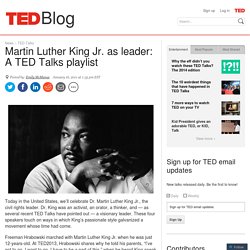
Martin Luther King Jr., the civil rights leader. Dr. King was an activist, an orator, a thinker, and — as several recent TED Talks have pointed out — a visionary leader. These four speakers touch on ways in which King’s passionate style galvanized a movement whose time had come. Freeman Hrabowski marched with Martin Luther King Jr. when he was just 12-years-old. Midway through her talk at TEDWomen 2011, Elizabeth Lesser points to Dr.
In his TEDxPugetSound talk about leadership, Simon Sinek expands on Dr. How to Read Faster: Bill Cosby’s Three Proven Strategies. By Maria Popova “Nobody gets something for nothing in the reading game.”
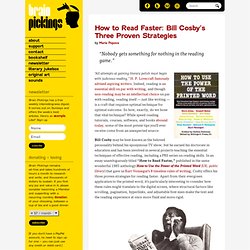
“All attempts at gaining literary polish must begin with judicious reading,” H. P. Lovecraft famously advised aspiring writers. Indeed, reading is an essential skill on par with writing, and though non-reading may be an intellectual choice on par with reading, reading itself — just like writing — is a craft that requires optimal technique for optimal outcome. Bill Cosby may be best-known as the beloved personality behind his eponymous TV show, but he earned his doctorate in education and has been involved in several projects teaching the essential techniques of effective reading, including a PBS series on reading skills. 1.
Skimming can give you a very good idea of this story in about half the words, and in less than half the time it’d take to read every word.So far, you’ve seen that previewing and skimming can give you a general idea about content — fast. Donating = Loving Share on Tumblr. The History of Philosophy, in Superhero Comics. By Maria Popova Roof-jumping with Kierkegaard, archaeological adventures with Foucault, wayfinding in the woods with William James, and more.
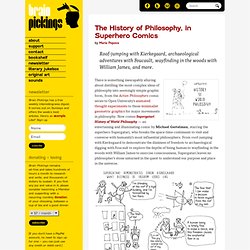
There is something inescapably alluring about distilling the most complex ideas of philosophy into seemingly simple graphic form, from the Action Philosophers comic series to Open University’s animated thought experiments to those minimalist geometric graphics for major movements in philosophy. Now comes Supergatari History of World Philosophy — an entertaining and illuminating comic by Michael Gertelman, starring the superhero Supergatari, who breaks the space-time continuum to visit and converse with humanity’s most influential philosophers. Complement the delightful Supergatari History of World Philosophy with these animated thought experiments and what philosophy is according to some of today’s most prominent philosophers. Donating = Loving Bringing you (ad-free) Brain Pickings takes hundreds of hours each month.
How to Master Your Creative Routine and the Pace of Productivity. By Maria Popova “When you work regularly, inspiration strikes regularly.”
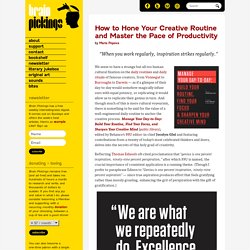
We seem to have a strange but all too human cultural fixation on the daily routines and daily rituals of famous creators, from Vonnegut to Burroughs to Darwin — as if a glimpse of their day-to-day would somehow magically infuse ours with equal potency, or replicating it would allow us to replicate their genius in turn. And though much of this is mere cultural voyeurism, there is something to be said for the value of a well-engineered daily routine to anchor the creative process.
Respect Yourself and Take Back Control of Your Calendar. Your time is your life.

So when you surrender control of your calendar to other people, you put them in control of your destiny. Our digital world has broken down the natural boundaries on how and when people can tell you what they think you should be doing. And with shared calendars, others can literally spend your time for you—if you let them. This means, it’s essential that you maintain a vigilant and active role in protecting and allocating your time in alignment with your priorities. This may seem improbable if you’ve lived at the mercy of other people’s whims for years. 1. Neurologist Oliver Sacks on Memory, Plagiarism, and the Necessary Forgettings of Creativity.
How the Universe Was Born: An Animated Explanation from CERN. Patti Smith’s Advice to the Young, by Way of William S. Burroughs. Einstein, Gödel, and the Science of Time Travel. Famous Writers’ Sleep Habits vs. Literary Productivity, Visualized. By Maria Popova The early bird gets the Pulitzer … sort of.
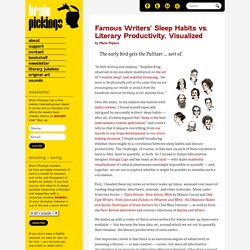
“In both writing and sleeping,” Stephen King observed in his excellent meditation on the art of “creative sleep” and wakeful dreaming, “we learn to be physically still at the same time we are encouraging our minds to unlock from the humdrum rational thinking of our daytime lives.” Over the years, in my endless fascination with daily routines, I found myself especially intrigued by successful writers’ sleep habits — after all, it’s been argued that “sleep is the best (and easiest) creative aphrodisiac” and science tells us that it impacts everything from our moods to our brain development to our every waking moment.
I found myself wondering whether there might be a correlation between sleep habits and literary productivity. The challenge, of course, is that data on each of these variables is hard to find, hard to quantify, or both. Donating = Loving Bringing you (ad-free) Brain Pickings takes hundreds of hours each month.